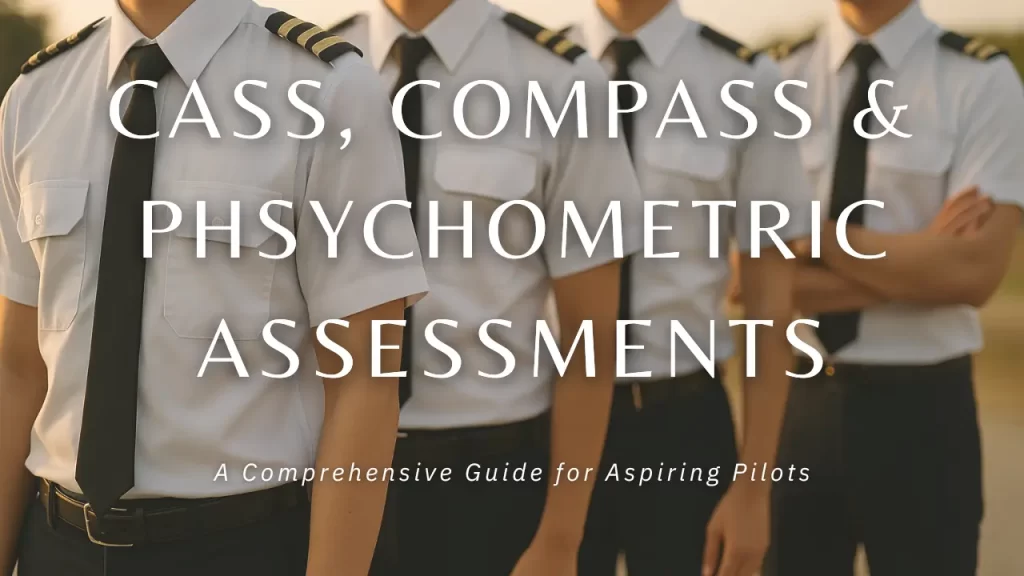
Embarking on a career as a commercial pilot requires more than just academic knowledge and flight training. Aviation authorities and airlines employ rigorous assessment systems to ensure that candidates possess the necessary cognitive abilities, psychomotor skills, and psychological resilience. Three pivotal components in this evaluation process are the Crew Assessment and Selection System (CASS), the Computerized Pilot Aptitude Screening System (COMPASS), and psychometric assessments.
Understanding CASS: Crew Assessment and Selection System
CASS is a multifaceted evaluation framework designed to assess a candidate’s aptitude for pilot training programs. It simulates real-world flying scenarios to evaluate various competencies, including:
Multitasking Abilities: Managing multiple tasks simultaneously, such as monitoring instruments, communicating with air traffic control, and navigating.
Situational Awareness: Understanding and interpreting the aircraft’s environment and systems.
Decision-Making Skills: Making prompt and effective decisions under pressure.
Communication Proficiency: Clearly and effectively conveying information.
Psychomotor Coordination: Harmonizing cognitive functions with physical movements.Airline Prep School | ALPS+1flightsimcenter.aero+1Wikipedia
At Airline Prep School (ALPS), our CASS setup replicates the actual assessment environment, providing candidates with a realistic experience to hone these critical skills.
Delving into COMPASS: Computerized Pilot Aptitude Screening System
Developed by the European Pilot Selection & Training (EPST), COMPASS is a computer-based testing system that evaluates key skills essential for pilot training. The assessment encompasses:
Control: Assessing hand-eye coordination through joystick-based tasks.
Slalom: Evaluating the ability to follow a moving target, testing tracking and anticipation skills.
Memory: Testing short-term memory retention and recall.
Mathematics: Assessing basic arithmetic and numerical reasoning.
Spatial Orientation: Evaluating the understanding of spatial relationships and orientation.
Multi-Tasking: Simultaneously managing multiple tasks, reflecting real cockpit scenarios.
Personality Questionnaire: Assessing behavioral tendencies and personality traits.
This comprehensive evaluation ensures that candidates possess the cognitive and psychomotor skills necessary for pilot training. More than 20,000 candidates worldwide have participated in the evaluation since its inception in the 1990s, making it a trusted tool in pilot selection. PilotAptitudeTest.com
The Significance of Psychometric Assessments
Psychometric assessments delve into a candidate’s personality traits, emotional stability, and behavioral tendencies. These evaluations are vital in ensuring that aspiring pilots can handle the psychological pressures of the job, make sound decisions under stress, and maintain composure during emergencies. Key areas assessed include:
Stress Tolerance: Ability to remain calm and effective under pressure.
Teamwork and Leadership: Collaborative skills and the capacity to lead when necessary.
Decision-Making Style: Approach to making decisions, especially in high-stakes situations.
Emotional Stability: Consistency in emotional responses and resilience.
At ALPS, we emphasize the importance of these evaluations in our training programs, preparing candidates for the multifaceted challenges of aviation.
– Ms. Tanvi Pakhale,
Psychologist (M.A. Industrial Psychology),
Airline Prep School
The Germanwings Incident: Emphasizing the Need for Mental Health Evaluations
The tragic crash of Germanwings Flight 9525 in 2015 underscored the critical importance of mental health evaluations in aviation. Co-pilot Andreas Lubitz deliberately crashed the aircraft into the French Alps, killing all 150 people on board. Investigations revealed that Lubitz had a history of depression and had concealed his condition from his employer. Wikipedia
This incident prompted regulatory bodies to reevaluate and strengthen mental health screening protocols for pilots. The European Commission mandated psychological assessments for pilots before employment and introduced support programs to address mental health issues among flight crews. Wikipedia
Preparing for a Cadet Pilot Program
Aspiring pilots aiming to join cadet programs should be prepared for a multi-stage selection process:
Academic Assessment: Tests in English, Mathematics, and Physics to evaluate foundational knowledge.
Aptitude Testing: CASS and COMPASS evaluations to assess cognitive and psychomotor skills.
Psychometric Evaluation: Personality assessments to determine psychological suitability.
Group Discussions and Personal Interviews: To evaluate communication skills, teamwork, and overall demeanor.
Successful candidates often receive a Letter of Intent (LOI) from the airline, indicating a conditional job offer upon completion of training.
How Airline Prep School (ALPS) Can Assist
At Airline Prep School (ALPS), we specialize in preparing aspiring pilots for the rigorous selection processes of leading airlines. Our comprehensive training programs cover:
CASS and COMPASS Test Preparation
Psychometric Evaluation Training
Group Discussion and Interview Coaching
With centers in Mumbai and Pune, ALPS offers state-of-the-art facilities and experienced instructors dedicated to helping you achieve your aviation dreams.
Contact Us:
Mumbai Center: 103, B wing Rassaz Castle CHS, Malpadongri No. 1, Opposite Gundavali Bus stop, Near Western Express Highway Metro station, Andheri East, Mumbai, Maharashtra 400093.
Email: info@airlineprepschool.com
Phone: +91 9222111043, +91 9222111042
Pune Center: Second Floor unit, Above Ganesh Bhel Opp FC College Main Gate, Fergusson College Rd, Pune, Maharashtra 411004.
Email: info@airlineprepschool.com
Phone: +91 9461777222
Embark on your journey to the skies with confidence. Let ALPS be your co-pilot in achieving your aviation aspirations.
Further Reading:
Note: For more information on pilot training programs and assessments, visit our official website.
